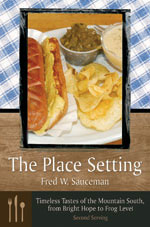Our nation's appreciation of regional and local foods is maturing. Advancing even.
This can be measured in any number of ways. Like the spike in grower-only farm markets. And the rediscovery of artisanal products like country ham. And the boon of writing about foodways in the zines-with-aspirations from Edible Communities.

I've found no better evidence of this phenomenon than in Fred Sauceman's two-volume series The Place Setting: Timeless Tastes of the Mountain South, from Bright Hope to Frog Level, recently published by Mercer University Press.
These books would not have been published ten years ago. Talk to Fred, a native of upland eastern Tennessee, and he'll tell you that, ten years ago, he wouldn't have written the essays therein. He wouldn't have seen the value in writing treatises on the food cultures of his corner of Appalachia. He was too busy cooking his way through the latest Marcella Hazan tome.
A change has come. And Fred has, inspired by fellow travelers (and fressers), begun to document his place with an attention to detail that borders on the pleasantly obsessive. Much of what he documents is richer and far more complex and curious than outlanders expect in a region often believed to be insular and monochromatic.
Although Fred's purview includes North Carolina, Tennessee, and Virginia, a measure of his knowledge can be taken in Knoxville, Tennessee, alone: In volume two, Fred introduces readers to the Regases, a Greek family that honed a reputation for fat steaks and red velvet cake; King Tut's Grill, a "Cairo karaoke roadhouse, run by Christian Orthodox Coptics," where the Egyptian owners serve ful madamas; and Arnold Zandi, the perennial political candidate who, while making runs for the presidency and the statehouse, sold hot dogs and Cokes at University of Tennessee football games, calling out, "Urpsies and Burpsies and Yummies for the tummy."



 Pinterest
Pinterest


